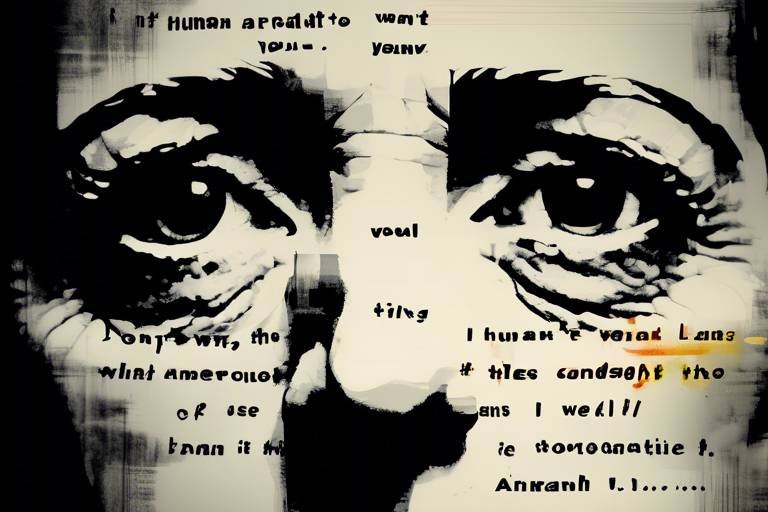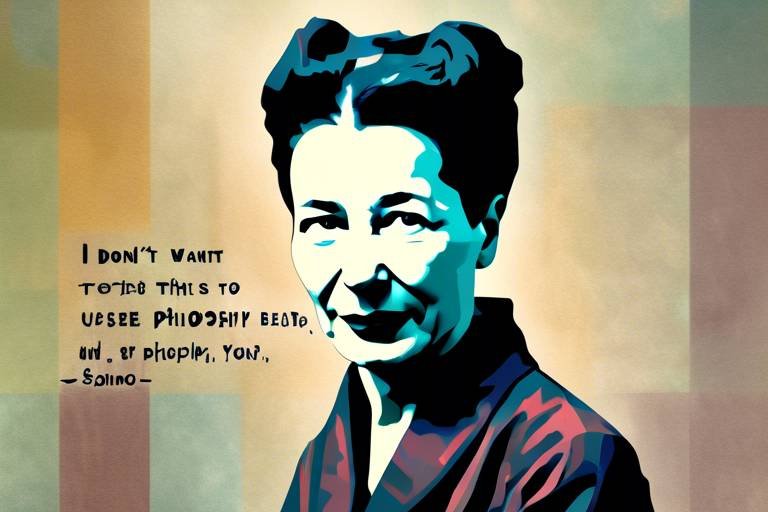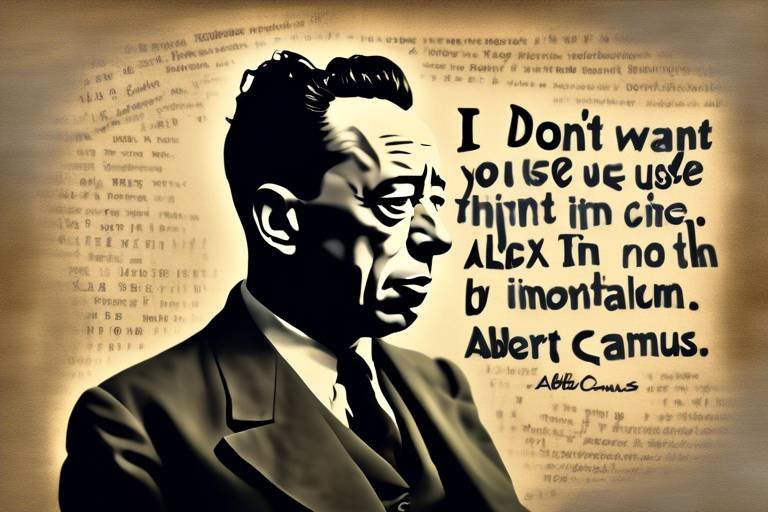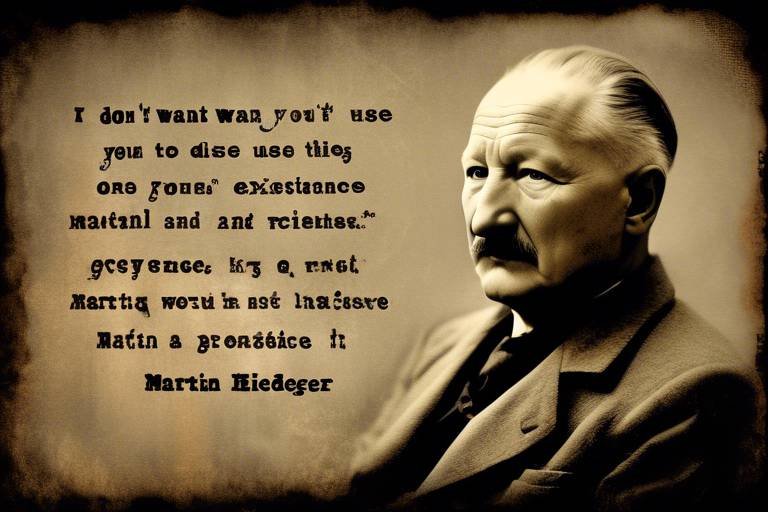The Human Condition Through the Lens of Hannah Arendt
This article explores the profound insights of philosopher Hannah Arendt regarding the human condition, focusing on her views about politics, action, and the nature of humanity in contemporary society. Arendt’s work is a treasure trove of thought-provoking ideas that challenge us to reflect on our roles as individuals within a larger community. Her exploration of political action, the nature of evil, and the importance of public discourse resonates deeply, especially in today's world, where the lines between good and evil often seem blurred.
Arendt emphasizes the significance of action in defining human existence. She argues that our individual actions are not just personal choices; they contribute to the public realm and shape our collective identity within society. Think of it this way: every action we take is like a pebble thrown into a pond, creating ripples that affect the entire surface. When we act, we not only express our own identities but also influence those around us. This interconnectedness is what makes our actions powerful. In a world that often feels fragmented, Arendt reminds us that our engagement in the public sphere is crucial for fostering a vibrant community.
One of Arendt's most chilling concepts is the banality of evil. This idea suggests that ordinary individuals can commit heinous acts without critical thought, often as a result of conformity and moral disengagement within political systems. It raises unsettling questions: How can someone become so desensitized to suffering? What happens when we prioritize obedience over ethics? Arendt's observations during the trial of Adolf Eichmann, a key figure in the Holocaust, serve as a stark reminder of how bureaucratic processes can dehumanize individuals and facilitate evil actions. Eichmann wasn’t a fanatical monster; he was an ordinary man who followed orders without questioning their morality. This realization is both terrifying and enlightening, pushing us to consider our own responsibilities in the face of injustice.
In navigating the complexities of moral responsibility and political action, Arendt argues that the capacity for judgment is essential. Judgment allows us to distinguish right from wrong, especially in challenging situations where the path forward is unclear. It’s not enough to follow rules or norms; we must engage our critical faculties and think deeply about the implications of our choices. This is particularly relevant in a world inundated with information and competing narratives. We must cultivate the ability to discern truth from falsehood, to question authority, and to hold ourselves accountable for our actions.
The trial of Adolf Eichmann serves as a compelling case study for Arendt’s theories. It showcased how the machinery of bureaucracy can strip away individuality and moral agency, allowing ordinary people to participate in horrific acts. The chilling reality of the trial was not just Eichmann's actions, but the realization that many others, like him, were complicit in a system that prioritized efficiency over humanity. This brings to light a crucial lesson: we must remain vigilant against the forces that seek to normalize evil through indifference and compliance.
Arendt's reflections on the Eichmann trial offer vital lessons for modern society. We must be ever-watchful against the rise of totalitarianism and the dangers of political apathy. Active citizenship is not just a right; it’s a responsibility we all share. Engaging in political discourse, participating in community actions, and holding our leaders accountable are essential steps in preserving our democratic values. Arendt's insights compel us to ask: Are we doing enough to challenge the status quo? Are we willing to stand up for what is right, even when it’s uncomfortable?
Arendt posits that public spaces are vital for political engagement and discourse. These arenas allow individuals to express their identities and opinions freely, fostering a rich tapestry of ideas and perspectives. In an age dominated by digital communication, the value of physical public spaces cannot be overstated. They serve as the backdrop for democratic participation, where diverse voices can converge and dialogue can flourish. By reclaiming and nurturing these spaces, we strengthen our collective identity and reaffirm our commitment to a democratic society.
Plurality, or the coexistence of diverse perspectives, is central to Arendt's understanding of the human condition. She emphasizes that the richness of human interactions in a democratic society is what makes it vibrant and resilient. In a world that often seeks to homogenize voices, Arendt champions the idea that our differences are not just to be tolerated but celebrated. This plurality fosters understanding and empathy, allowing us to learn from one another's experiences.
Arendt highlights storytelling as a powerful means of preserving individual experiences and fostering understanding among diverse groups within society. Stories connect us, bridging gaps between different backgrounds and perspectives. They remind us that behind every statistic is a human being with hopes, dreams, and struggles. By sharing our stories, we create a shared narrative that promotes solidarity and compassion.
Finally, Arendt's insights on technology illustrate its dual role in shaping human experiences. While technology can enhance communication and connection, it also poses threats to authentic human interactions and political engagement. In our hyper-connected world, we must be mindful of how technology influences our relationships and civic participation. Are we using it to empower our voices, or has it become a tool for division and distraction?
- What is the banality of evil? The banality of evil refers to the idea that ordinary people can commit atrocious acts simply by conforming to authority without critical thought.
- How does Arendt define action? Arendt defines action as a fundamental aspect of human existence that shapes our identity and influences the public realm.
- Why are public spaces important? Public spaces facilitate political engagement and discourse, allowing individuals to express their identities and opinions freely.

The Nature of Action
Hannah Arendt's exploration of the nature of action is nothing short of revolutionary. She argues that action is not merely a function of individual will but a profound expression of our humanity. In her view, action is what defines our existence in the public realm, shaping our identities and our relationships with others. When we act, we are not just doing something; we are making a statement about who we are and what we value. This is where the magic happens—each action contributes to the rich tapestry of society, influencing collective narratives and shaping our shared future.
Arendt emphasizes that action is inherently unpredictable. Unlike labor or work, which can be planned and controlled, action introduces an element of surprise. It is this unpredictability that makes human interaction so vibrant and dynamic. Think of it like a dance; each step can lead to a new rhythm, a new direction. When we engage with others in action, we open ourselves up to possibilities that extend beyond our individual intentions. This is where we find the essence of plurality—the coexistence of diverse perspectives and experiences that enrich our social fabric.
Moreover, Arendt posits that the act of speaking and engaging in dialogue is a form of action in itself. When we voice our thoughts, we are participating in a collective discourse that has the power to influence opinions and change minds. This is particularly crucial in contemporary society, where the ability to express oneself freely is often under threat. In a world that sometimes feels dominated by silence, the act of speaking out can be revolutionary. It challenges the status quo and invites others to join the conversation, fostering a sense of community and shared purpose.
In essence, action is about interaction. It is through our actions that we reveal our true selves, connect with others, and contribute to the larger narrative of humanity. Arendt reminds us that every action carries weight; it has the potential to inspire, to provoke, and to transform. This understanding of action is not just philosophical—it has practical implications for how we engage in our communities and the world at large. By recognizing the power of our actions, we can become more conscious participants in the ongoing story of our society.
Ultimately, Arendt's insights on the nature of action challenge us to reconsider our roles as citizens. Are we merely passive observers, or are we active participants in shaping our world? The answer lies in our willingness to engage, to act, and to connect with one another. In a time when division often seems to reign, Arendt's call to action is a reminder of the profound impact we can have when we step into the public sphere and embrace our shared humanity.

Hannah Arendt's concept of the banality of evil is both striking and unsettling. It suggests that the most horrific acts can be committed not by fanatical monsters, but by ordinary individuals who simply follow orders and conform to societal norms. This notion emerged prominently during her coverage of the trial of Adolf Eichmann, a key architect of the Holocaust. Arendt observed that Eichmann was not a sadistic killer but rather a bureaucrat who epitomized the dangers of thoughtlessness. He operated within a bureaucratic system that prioritized efficiency over morality, showcasing how the machinery of state can dehumanize individuals.
To understand the banality of evil, we must consider the factors that lead ordinary people to commit extraordinary atrocities. Arendt argues that this phenomenon arises from a lack of critical thinking and moral reflection. When individuals cease to question the ethical implications of their actions, they become susceptible to engaging in behavior that is fundamentally at odds with their humanity. This raises an essential question: How can we prevent ourselves from becoming complicit in systems that perpetuate evil?
In contemporary society, the lessons drawn from Arendt’s insights are particularly relevant. We live in a world where conformity and obedience to authority can lead to moral disengagement. People often find themselves in situations where they prioritize loyalty to a group or institution over ethical considerations. This is not merely a historical lesson; it is an ongoing challenge that requires vigilance and active engagement. Arendt’s work compels us to reflect on our responsibilities as individuals within a larger societal framework.
Consider the following aspects of the banality of evil:
- Conformity: The pressure to fit in can lead individuals to overlook their moral compass.
- Desensitization: Repeated exposure to violence or injustice can numb our reactions, making it easier to accept abhorrent behavior.
- Authority: The influence of authority figures can lead to a dangerous abdication of personal responsibility.
Arendt’s exploration of these themes serves as a cautionary tale. It reminds us that the capacity for evil exists within all of us, especially in environments that discourage critical thought. To combat this, we must cultivate a culture of active citizenship where questioning, debating, and engaging in moral reflection are not just encouraged but celebrated. Only then can we hope to foster a society that actively resists the forces of conformity and moral disengagement.
Ultimately, Arendt's analysis of the banality of evil is a call to action. It urges us to remain vigilant, to think deeply about our choices, and to resist the allure of complacency. By doing so, we honor not only the memory of those who suffered under totalitarian regimes but also our own humanity. In a world that often seems devoid of moral clarity, Arendt's insights provide a beacon of hope, reminding us that the battle against evil begins within each of us.
- What is the banality of evil? It refers to the idea that ordinary people can commit atrocious acts simply by conforming to authority or societal norms without critical thinking.
- How does this concept apply to modern society? It serves as a warning about the dangers of conformity and the importance of moral responsibility in our actions.
- What can individuals do to combat the banality of evil? Cultivating critical thinking, engaging in active citizenship, and questioning authority are essential steps.

Hannah Arendt believed that the capacity for judgment is not merely a philosophical exercise but rather a fundamental aspect of our humanity. In her view, judgment is what distinguishes us from mere automatons; it is the lens through which we perceive the world, assess our actions, and determine right from wrong. Arendt argued that in a society where moral responsibility is often overshadowed by bureaucratic processes and collective action, the need for individual judgment becomes even more critical.
Imagine being in a crowded theater, where everyone is laughing at a joke that you find deeply troubling. Do you join in the laughter, or do you stand up and voice your discomfort? This is the essence of Arendt's exploration of judgment; it requires a willingness to engage with uncomfortable truths and to act according to one's conscience, even when the crowd is moving in a different direction.
Arendt's insights remind us that judgment is not about arriving at a definitive answer but rather about the process of critical thinking and reflection. She posited that the ability to judge is vital for political action, especially in a world where moral ambiguity often reigns. In her view, individuals must cultivate their judgment to navigate the complexities of modern life. This involves:
- Engaging in thoughtful dialogue with others
- Questioning societal norms and expectations
- Reflecting on personal values and beliefs
The importance of judgment is particularly evident in the context of political action. Arendt argued that when people fail to exercise their judgment, they become susceptible to the influence of authoritarian regimes that manipulate public opinion and stifle dissent. This was poignantly illustrated during the Eichmann trial, where Arendt observed how Eichmann, a seemingly ordinary man, became a cog in the machinery of evil due to his inability to think critically about his actions.
Moreover, Arendt emphasized that judgment is not an isolated act; it is inherently social. It flourishes in environments where diverse perspectives can be shared and debated. When individuals come together in public discourse, they create a space for collective judgment that can challenge injustice and promote accountability. This communal aspect of judgment is vital in a democratic society, where the voices of the many can counterbalance the power of the few.
In conclusion, Arendt's reflections on the role of judgment serve as a powerful reminder of our moral responsibilities as individuals. In a world increasingly dominated by conformity and groupthink, the ability to judge thoughtfully and independently is essential. It is through our judgments that we can navigate the murky waters of ethical dilemmas and contribute meaningfully to the collective human experience.
- What is the significance of judgment in Arendt's philosophy?
Judgment is crucial for distinguishing right from wrong and is essential for moral responsibility and political action. - How does Arendt relate judgment to the Eichmann trial?
She illustrates how the failure to exercise judgment can lead to complicity in evil actions, as seen in Eichmann's bureaucratic role in the Holocaust. - Why is public discourse important for judgment?
Public discourse allows for the exchange of diverse perspectives, fostering a communal environment where individuals can engage in critical thinking.

The Eichmann Trial, held in 1961 in Jerusalem, stands as a pivotal moment in both legal history and philosophical discourse, particularly through the lens of Hannah Arendt's theories. Adolf Eichmann, a key architect of the Holocaust, was not the monster many expected him to be; instead, he presented as an ordinary bureaucrat, a man who seemed more concerned with following orders than with the moral implications of his actions. This shocking revelation led Arendt to coin the term "the banality of evil."
Arendt's observations during the trial illuminated a profound truth about human nature: that evil can manifest not just through monstrous individuals but through the mundane actions of ordinary people caught up in bureaucratic systems. Eichmann's defense hinged on his claim that he was simply following orders, a chilling reminder of how easily individuals can become complicit in heinous acts when they abdicate their moral responsibility. This raises critical questions: How often do we, in our own lives, choose convenience over conscience? Are we not, at times, unwitting participants in systems that perpetuate injustice?
Throughout the trial, Arendt noted the chilling effect of bureaucracy on human agency. The courtroom proceedings revealed how a structured, impersonal system could strip away individual moral accountability. For example, Eichmann's meticulous attention to detail in organizing the logistics of deportation highlighted a disturbing disconnect between his actions and their moral consequences. This disconnection serves as a cautionary tale for contemporary society, urging us to remain vigilant against the dangers of conformism and the passive acceptance of authority.
Moreover, the trial sparked a broader conversation about moral responsibility in political action. Arendt argued that the capacity for judgment is essential to our humanity. It is not enough to simply follow orders; we must engage in critical thinking and ethical reflection. The Eichmann Trial serves as a stark reminder of the importance of maintaining our moral compass, even in the face of overwhelming pressure to conform.
In reflecting on the Eichmann Trial, we must consider the lessons it imparts for modern society. It is a call to action for individuals to actively participate in civic life and to foster a culture of critical engagement. As we navigate an increasingly complex world, the need for vigilance against totalitarianism and the importance of active citizenship cannot be overstated. We must remember that the choices we make—both big and small—shape the society we live in.
| Key Themes from the Eichmann Trial | Description |
|---|---|
| Banality of Evil | The concept that ordinary people can commit atrocious acts when they conform to authority. |
| Moral Responsibility | The necessity for individuals to engage in ethical reflection and judgment. |
| Bureaucratic Dehumanization | How bureaucratic systems can strip individuals of their moral agency. |
| Active Citizenship | The importance of civic engagement in preventing totalitarianism. |
In conclusion, the Eichmann Trial is not merely a historical event; it is a profound exploration of the human condition, urging us to confront uncomfortable truths about ourselves and our society. Arendt’s insights compel us to question our own roles within the systems we inhabit and to advocate for justice and moral integrity in our everyday lives.
- What was the main outcome of the Eichmann Trial? The trial highlighted the dangers of blind obedience to authority and emphasized the importance of moral responsibility.
- How did Arendt view Eichmann's actions? Arendt viewed Eichmann as a representation of the 'banality of evil,' illustrating how ordinary individuals can commit atrocities without critical thought.
- What relevance does the Eichmann Trial have today? The trial serves as a reminder of the need for active citizenship and vigilance against oppressive systems.

Hannah Arendt's reflections on the Eichmann trial offer profound lessons that resonate deeply with our contemporary society. One of the most striking takeaways is the **importance of vigilance** against the creeping tide of totalitarianism. In an age where political apathy can easily take root, Arendt reminds us that it is our **responsibility** to remain engaged and informed citizens. Just as Eichmann's bureaucratic detachment allowed him to commit horrific acts without a second thought, we too can fall into a similar trap if we choose to disengage from the political realm.
Moreover, Arendt emphasizes the necessity of **active citizenship**. This means not just casting a vote every few years but participating in the ongoing dialogue about our societal values and the direction of our communities. In a world where social media can amplify voices, it becomes crucial to discern the **truth** from the noise. We must ask ourselves: Are we contributing to a constructive discourse, or are we merely echoing the sentiments of the crowd? The danger lies in conformity, and Arendt's insights urge us to cultivate our own judgments and engage critically with the world around us.
Another lesson from Arendt is the **value of public spaces**. In her view, these spaces are essential for political engagement and discourse. They provide a platform for individuals to express their identities and opinions freely. In today's digital age, the concept of public space has evolved. While online platforms offer new avenues for discussion, they can also lead to polarization and echo chambers. Thus, we must strive to create inclusive environments—both online and offline—where diverse perspectives can coexist and flourish. This is not merely a call for tolerance but an invitation to celebrate our differences as a source of strength.
To encapsulate these lessons, we can summarize them into key principles that guide us in our modern society:
- Stay Informed: Knowledge is power. Engage with current events and understand the political landscape.
- Participate Actively: Attend town halls, join community groups, and voice your opinions.
- Foster Dialogue: Encourage conversations with those who hold different views to broaden your perspective.
- Value Public Spaces: Support initiatives that promote open discussion and civic engagement.
In conclusion, Arendt's insights serve as a **cautionary tale** and a call to action. They remind us that the human condition is not just about individual existence but about our interconnectedness and responsibilities toward one another. As we navigate the complexities of modern life, let us take to heart the lessons of vigilance, active participation, and the importance of public discourse. Only then can we hope to build a society that honors the richness of our shared humanity.
What is the main idea behind Arendt's concept of the "banality of evil"?
Arendt's concept of the "banality of evil" suggests that ordinary people can commit atrocious acts without critical thought or moral reflection, often due to conformity and bureaucratic processes.
How can we apply Arendt's lessons to our current political climate?
By staying informed, participating actively in civic life, fostering open dialogue, and valuing public spaces, we can combat political apathy and promote a more engaged society.
Why are public spaces important according to Arendt?
Public spaces allow individuals to express their identities and engage in political discourse, which is essential for a healthy democracy and the coexistence of diverse perspectives.

Public space is more than just a physical location; it is a crucial arena for political engagement and social interaction. Hannah Arendt believed that these spaces allow individuals to come together, exchange ideas, and express their identities freely. Think of public spaces as the stages of democracy, where the drama of human interaction unfolds. Without them, the vibrant tapestry of society becomes muted, and voices that challenge the status quo may never be heard. In a world where technology often isolates us behind screens, the value of physical spaces where we can gather and converse cannot be overstated.
Arendt argued that public spaces foster a sense of community and belonging. They are the places where we can witness the plurality of perspectives that enrich our understanding of the human condition. When people from diverse backgrounds come together, they share their stories, beliefs, and experiences, creating a mosaic of ideas that challenges our assumptions and broadens our horizons. This interaction is vital for a healthy democracy, as it encourages dialogue and debate, which are essential for informed decision-making.
Moreover, public spaces serve as a reminder of our shared humanity. When we gather in parks, town squares, or community centers, we are not just occupying space; we are participating in a collective experience. This shared participation can lead to a sense of responsibility towards one another and the community as a whole. Arendt's insights remind us that active citizenship is not just about voting or engaging in political discourse; it's about being present in the public realm and contributing to the common good.
However, the importance of public space goes beyond mere interaction; it also plays a critical role in political activism. History has shown us that many social movements have gained momentum in public spaces, where individuals gather to protest, advocate for change, or simply express their dissent. These gatherings can serve as powerful catalysts for social transformation. When people unite in a shared space, their collective energy can challenge oppressive systems and inspire action. Think of iconic moments in history, like the civil rights marches or the protests for climate action; these events often took place in public spaces, where the sheer number of voices could not be ignored.
In conclusion, public spaces are essential for fostering political engagement, community interaction, and social change. As we navigate the complexities of contemporary society, it is imperative to recognize and protect these spaces. They are not just locations on a map; they are the heartbeats of our democracy, where the essence of humanity can truly flourish.
- Why are public spaces important for democracy?
Public spaces facilitate open dialogue, community engagement, and political activism, which are essential for a healthy democratic society. - How can we protect public spaces?
Advocacy for policies that prioritize the creation and maintenance of public spaces, along with community involvement, can help protect these vital areas. - What role does technology play in public spaces?
While technology can enhance communication, it can also isolate individuals; thus, balancing online and offline interactions is crucial for community cohesion.
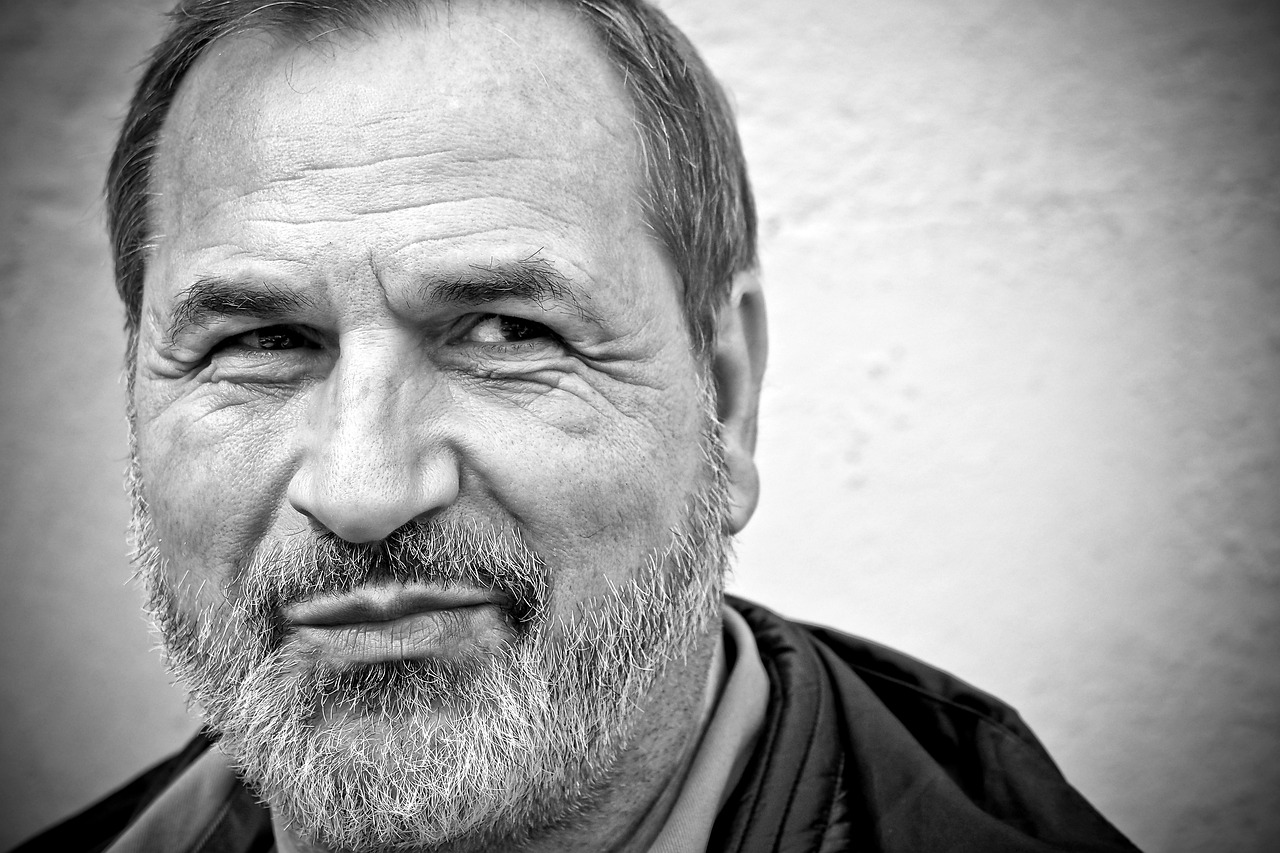
Hannah Arendt's exploration of the human condition cannot be fully appreciated without understanding the concept of plurality. Plurality, in Arendt's view, is the essence of what it means to be human; it encapsulates the idea that we are not solitary beings but rather exist in a vibrant tapestry of diverse perspectives. This coexistence of different viewpoints enriches our lives and forms the backbone of democratic societies. Imagine a bustling marketplace where every stall offers something unique—this is what plurality looks like in the realm of human interactions. It is through our differences that we come to understand ourselves and others, fostering a sense of community that is both dynamic and essential for societal growth.
Arendt argues that plurality is not merely a backdrop for human action; it is a fundamental condition that allows for the expression of individuality. When people come together, they bring their own backgrounds, experiences, and stories, which can lead to a profound exchange of ideas. This is crucial for political engagement and discourse, as it allows for a multiplicity of voices to be heard. In a world where everyone thinks alike, we risk stagnation. However, when we embrace our differences, we create a rich dialogue that can lead to innovative solutions to societal issues.
Moreover, the importance of plurality extends beyond just dialogue; it also shapes our identities. Each person contributes to the collective identity of a community, and this interplay of identities is what makes society vibrant. Arendt emphasizes that when individuals engage with one another, they not only assert their own identities but also recognize and appreciate the identities of others. This mutual recognition is essential for fostering empathy and understanding, which are vital for any thriving society.
In her writings, Arendt also warns against the dangers of homogenization, where the unique voices of individuals are drowned out by a singular narrative. This can happen in various contexts, from political regimes that suppress dissent to social media platforms that amplify echo chambers. Therefore, it is crucial to maintain spaces where diverse perspectives can be shared and celebrated. This is where public spaces come into play—places where individuals can gather, converse, and engage in meaningful dialogue. These spaces are not just physical locations; they are also metaphorical arenas where ideas can clash, coexist, and evolve.
Ultimately, embracing plurality means acknowledging that no single perspective holds the truth. Instead, the truth is often a mosaic made up of many different pieces. Arendt's insights remind us of the importance of listening to others, being open to new ideas, and recognizing the value of diverse experiences. In a world that often seems polarized, her philosophy serves as a beacon, encouraging us to celebrate our differences and engage in the rich tapestry of human experience.
- What is plurality according to Hannah Arendt?
Plurality, for Arendt, is the coexistence of diverse perspectives that enrich human interactions and form the foundation of democratic societies. - Why is plurality important in society?
Plurality allows for the expression of individuality, fosters empathy and understanding, and encourages innovative solutions through dialogue among diverse voices. - How can we promote plurality in modern society?
We can promote plurality by creating inclusive public spaces for dialogue, encouraging diverse viewpoints, and resisting the urge toward homogenization in discussions.

Storytelling is not merely a form of entertainment; it is a profound mechanism through which we understand our world and connect with one another. For Hannah Arendt, storytelling serves as a vital tool for preserving individual experiences and fostering empathy among diverse groups within society. Think of storytelling as the thread that weaves together the fabric of our shared human experience. It allows us to step into another's shoes, to grasp their struggles and triumphs, and to recognize our common humanity.
Arendt believed that every story carries with it a unique perspective, a distinctive voice that contributes to the rich tapestry of human plurality. By sharing our narratives, we not only assert our identities but also invite others to engage with our realities. This engagement is essential in a democratic society where understanding and dialogue are crucial for coexistence. In a way, storytelling is like a bridge, connecting disparate islands of thought and experience.
Moreover, Arendt emphasized the importance of storytelling in the political realm. It is through stories that we can challenge dominant narratives and highlight marginalized voices. When individuals share their stories, they illuminate the often-hidden injustices and complexities of their lives, prompting others to reconsider their perspectives. This is particularly vital in an age where misinformation can easily distort reality. By telling our stories, we reclaim our agency and assert our truths in a world that often seeks to silence them.
To illustrate this point, consider the following aspects of storytelling:
- Preservation of Memory: Stories serve as a repository of collective memory, ensuring that the experiences of past generations are not forgotten.
- Fostering Empathy: Engaging with diverse narratives helps cultivate empathy, allowing us to understand the experiences of others.
- Encouraging Dialogue: Stories can spark conversations, encouraging individuals to share their perspectives and engage in meaningful discussions.
- Challenging Power Structures: Through storytelling, marginalized voices can confront and challenge existing power dynamics, paving the way for social change.
In conclusion, storytelling is a powerful tool that transcends mere words on a page. It is an act of political engagement and a means of asserting our identities in a complex world. By embracing the art of storytelling, we not only enrich our own lives but also contribute to a more inclusive and understanding society. As we navigate the challenges of contemporary life, let us remember the importance of sharing our stories, for in them lies the potential for connection, understanding, and transformation.
- Why is storytelling important in society? Storytelling helps preserve memories, fosters empathy, and encourages dialogue among diverse groups, making it crucial for social cohesion.
- How does storytelling influence politics? By sharing personal narratives, individuals can challenge dominant narratives and highlight marginalized voices, promoting social change.
- Can storytelling help combat misinformation? Yes, by presenting authentic experiences and truths, storytelling can counter misinformation and provide a more accurate understanding of reality.

This article explores the profound insights of philosopher Hannah Arendt regarding the human condition, focusing on her views about politics, action, and the nature of humanity in contemporary society.
Arendt emphasizes the significance of action in defining human existence, highlighting how individual actions contribute to the public realm and collective identity within society.
This concept explores how ordinary individuals can commit heinous acts without critical thought, illustrating the dangers of conformity and moral disengagement in political systems.
Arendt argues that the capacity for judgment is essential in distinguishing right from wrong, particularly in the context of moral responsibility and political action.
The trial of Adolf Eichmann serves as a case study for Arendt's theories, showcasing how bureaucratic processes can dehumanize individuals and facilitate evil actions.
Arendt's reflections on the Eichmann trial provide crucial lessons about the importance of vigilance against totalitarianism and the need for active citizenship.
Arendt posits that public spaces are vital for political engagement and discourse, allowing individuals to express their identities and opinions freely.
Plurality, or the coexistence of diverse perspectives, is central to Arendt's understanding of the human condition, emphasizing the richness of human interactions in a democratic society.
Arendt highlights storytelling as a means of preserving individual experiences and fostering understanding among diverse groups within society.
When we think about technology today, it’s hard not to feel a mix of excitement and apprehension. Arendt recognized that technology isn’t just a tool; it shapes our very existence. In her view, technology has a dual role that can either enhance or threaten our authentic human connections and political engagement. Imagine technology as a double-edged sword, one side offering convenience and innovation, while the other risks alienation and detachment.
On one hand, technology has revolutionized the way we communicate. Social media platforms, for instance, allow us to connect with people across the globe instantly. However, Arendt would caution us to consider the quality of these connections. Are we truly engaging with each other, or are we merely exchanging superficial comments? The richness of face-to-face interactions is often lost in the digital noise, making our relationships feel more like transactions than genuine connections.
Moreover, technology can create echo chambers where individuals only encounter opinions that reinforce their own beliefs. This phenomenon can stifle political discourse, as diverse perspectives are drowned out by the clamor of confirmation bias. Arendt believed that true political engagement requires a vibrant exchange of ideas, something that can be hindered by the isolating nature of technology.
To illustrate this impact, consider the following table that summarizes the positive and negative effects of technology on human interaction:
| Positive Effects | Negative Effects |
|---|---|
| Enhanced global communication | Superficial relationships |
| Access to diverse information | Echo chambers and misinformation |
| Opportunities for activism | Detachment from real-world issues |
In a world where technology is omnipresent, Arendt’s insights remind us to be vigilant. We must strive to maintain our humanity in the face of rapid technological advancement. It’s essential to engage critically with technology, ensuring it serves to enrich our lives rather than diminish our connections with others. After all, the essence of our humanity lies in our ability to act, interact, and engage meaningfully with one another.
- What is Hannah Arendt's view on technology? Arendt saw technology as a double-edged sword that could enhance communication but also risk alienation.
- How does technology impact political engagement? It can create echo chambers that stifle diverse opinions and meaningful discourse.
- What should we be cautious about regarding technology? We should be wary of superficial connections and the potential for misinformation to spread.
Frequently Asked Questions
-
What is the significance of action in Hannah Arendt's philosophy?
Hannah Arendt believed that action is fundamental to human existence. She argued that individual actions contribute to the public realm and help shape our collective identity within society. It's like each person's actions are threads in a tapestry, weaving together the fabric of our shared experience.
-
What does Arendt mean by "the banality of evil"?
The "banality of evil" is a concept Arendt introduced to describe how ordinary people can commit atrocious acts without deep moral reflection. It highlights the dangers of conformity and the risks of disengaging from moral responsibility, suggesting that evil can emerge from unthinking adherence to authority.
-
How does Arendt view the role of judgment in political action?
For Arendt, the capacity for judgment is vital in distinguishing right from wrong, especially in political contexts. She believed that individuals must engage critically with their beliefs and choices, as this judgment is what empowers them to take responsible action in society.
-
What lessons can we learn from the Eichmann trial?
The Eichmann trial serves as a powerful case study for Arendt's theories, illustrating how bureaucratic systems can dehumanize individuals and enable evil actions. It reminds us of the necessity for vigilance against totalitarianism and the importance of active citizenship to prevent such horrors from happening again.
-
Why are public spaces important according to Arendt?
Arendt posited that public spaces are crucial for political engagement and discourse. They provide a platform for individuals to express their identities and opinions freely, fostering a vibrant democratic society where diverse voices can be heard and valued.
-
What does plurality mean in the context of Arendt's work?
Plurality refers to the coexistence of diverse perspectives, which is central to Arendt's understanding of the human condition. She emphasized that this richness of human interactions is essential for a thriving democracy, as it encourages dialogue and understanding among different groups.
-
How does Arendt view the impact of technology on human connections?
Arendt recognized that technology has a dual role in shaping human experiences. While it can enhance connections and facilitate communication, it also poses threats to authentic interactions and political engagement, potentially alienating individuals from one another.

